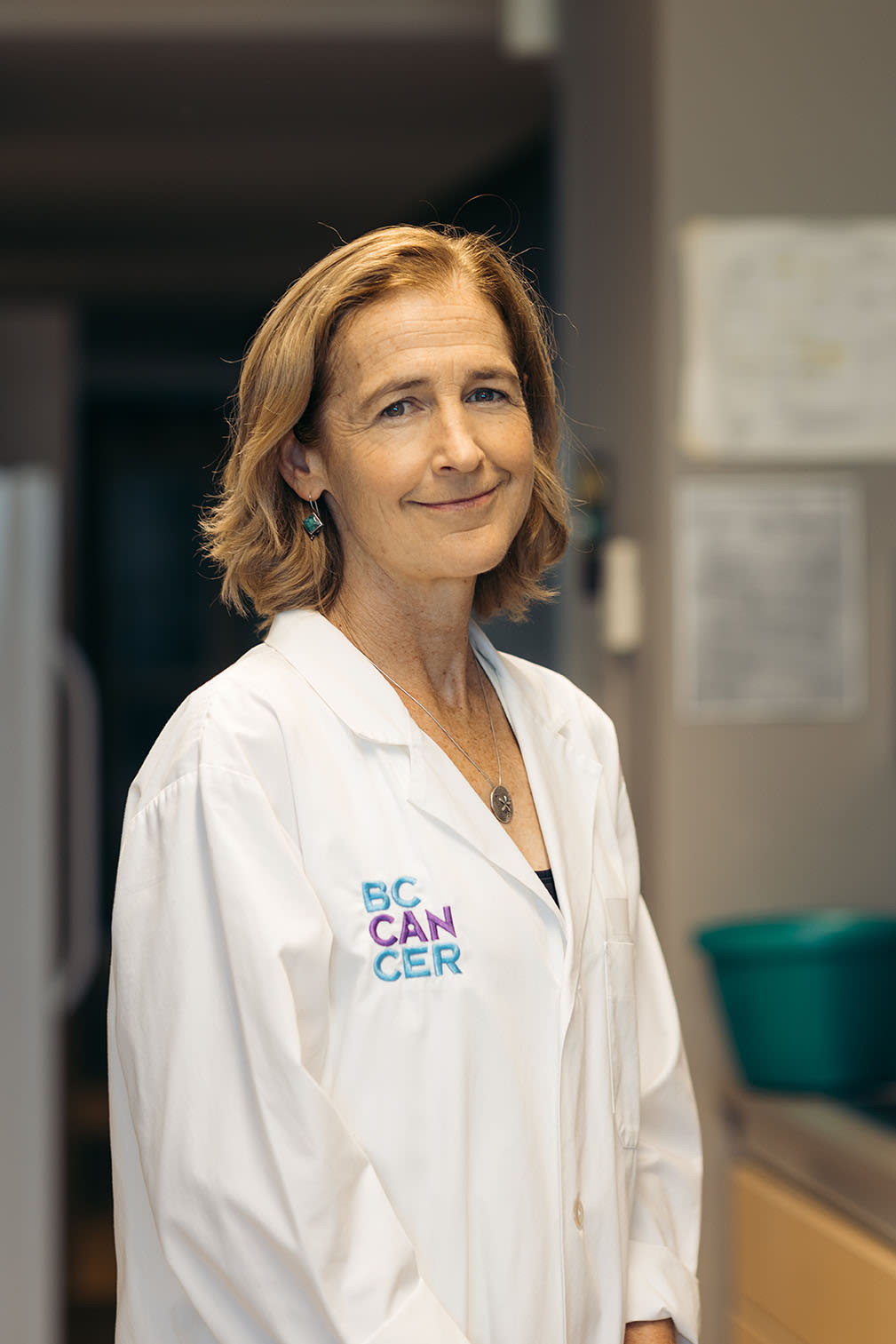Dr. Jessica McAlpine: Driving Research and Care to Help Women Achieve a Life Beyond Cancer
December 1, 2023
Found in Endometrial Cancer, Gynecologic Cancer, Ovarian Cancer, OvCaRe
Dr. Jessica McAlpine works just two blocks from the Vancouver hospital where she was born. But her path to BC Cancer, where she’s head of the Division of Gynecologic Oncology, took her to the East Coast of the U.S. to California and back again. All before what was meant to be a temporary training stop in Vancouver evolved into an almost two-decade long career that is changing the way the world diagnoses and treats endometrial, ovarian and vulvar cancers.

After graduating from the University of Victoria, Dr. McAlpine studied medicine at Johns Hopkins and later gynecology and obstetrics at Stanford in the U.S. In the last year of a fellowship at Yale, she returned home to Vancouver on a month-long rotation opportunity to work with a specialty surgeon — and never left.
What kept her in B.C. was coincidentally born in the same hospital she was, albeit in the cafeteria on the back of a napkin in 2000 when a geneticist, gynecologic oncologist and pathologist scratched out a vision for B.C.’s Ovarian Cancer Research Program (OVCARE).
“I really liked the high quality of care, compassion and empathy from this great group of leaders,” says Dr. McAlpine of OVCARE co-founders Drs. David Huntsman, Dianne Miller and Blake Gilks whom she joined the ranks of in 2006.
She’s now the director of OVCARE’s Tissue Bank, which contains more than 86,000 tissue specimens from over 9,800 patients that have been shared with national and international collaborators as a foundation for translational research, contributing to over 1,500 publications and discoveries that have led to changes in clinical practice.
Dr. McAlpine created the rare opportunity to work as a surgeon-scientist at BC Cancer and UBC. Landing a role evenly split between attending to patients, in clinics and in surgery, and performing translational research is incredibly lucky, she says — and they both feed each other.
“Working with patients makes me more relevant in research. I get to see where the deficiencies are — the challenges in pathology reporting or the lack of nuance in treatments such as giving the same drugs to all patients — and then we can tackle them in the lab.”
Promising changes offer more precise treatment
Endometrial cancer is the most common gynecological cancer in the developed world and yet, like many women’s cancers, its greatly understudied, says Dr. McAlpine. Patients are assigned a grade, subtype and stage, however, pathologists often disagree on these, meaning the same woman may receive different diagnoses and be offered different treatment options (type of surgery and need for additional chemotherapy or radiation.) This can lead to unnecessary treatment with adverse side effects or a missed opportunity for a cure.
Dr. McAlpine, together with Dr. Aline Talhouk, a data scientist and computational statistics expert with OVCARE, developed ProMisE (Proactive Molecular Risk Classifier for Endometrial Cancer), a practice-changing classification tool that organizes endometrial cancers into four subtypes that provide prognostic information and identify opportunities for targeted treatment.
It can also identify patients who are at increased risk of having inherited genetic syndromes that place them at increased risk of developing other cancers. By recognizing these individuals, it allows patients and their relatives to undergo life-saving screening or risk-reducing steps.

In 2020, ProMisE was adopted by the World Health Organization (WHO) and is now available to anyone newly diagnosed with endometrial cancer in B.C. to help determine where they’ll receive care.
Some endometrial cancers can be safely managed by gynecologists within a patient’s own community while others are recommended to undergo more complex surgery and treatment at a BC Cancer centre, says Dr McAlpine.
“Through ProMisE we can deliver consistent and equitable care and make recommendations that will be best for their cancer, no matter where a person lives.”
B.C. innovation spares unnecessary treatment
In a recent study, Dr. McAlpine’s team discovered that up to half of endometrial cancers, identified through molecular features, don’t need chemotherapy or radiation. Their research prompted the TAPER study, which identifies early stage endometrial cancers with low recurrence risk.
Sparing hundreds of women unnecessary toxic treatment, the strategy is expanding across Canada and the world with 8 countries already enrolled. Another OVCARE trial, STRIVE, is gaining global recognition for similar findings in rare and understudied vulvar cancers.
Dr. McAlpine’s world-leading work received a highly coveted investment from the Canadian government when she was appointed a Tier 1 Canada Research Chair in Molecular Stratification of Gynecologic Cancers. Other funding is allowing her team to explore additional research to improve endometrial cancer outcomes.
Donors are fuelling progress in overlooked cancers
These grants and generous donor funding through the BC Cancer Foundation are crucial to her work, she says. “I’m still surprised and semi-horrified when I look at the allocation of funds, especially in gynecological cancers. Endometrial cancer is actually the fourth most common cancer in women, and on a trajectory to be second only to breast in the next couple of decades. And yet it has a sliver of the investment compared to prostate cancer.”
Despite these challenges, the OVCARE team are making a real difference in the lives of women facing these underfunded diseases.
“I feel really proud and grateful to be a part of what we have been able to accomplish in a relatively short time that has impacted care for patients down the street and internationally,” says Dr. McAlpine.

But there’s much more to be done in what she calls “an incredibly exciting field with a mix of internal medicine, surgery and social work to help women — and their families.” As she approaches 20 years at BC Cancer, Dr. McAlpine has no plans to stop advocating for and advancing women’s cancer care.
“I really appreciate the breadth of care in women’s health, being able to take care of a 14-year-old to an 89-year-old,” she says. And if sometime on that life journey they face cancer, Dr. McAlpine and her team are providing real hope that the very best in care and outcomes will be waiting for them.
Help BC Cancer experts provide a life beyond cancer for patients, donate today.


